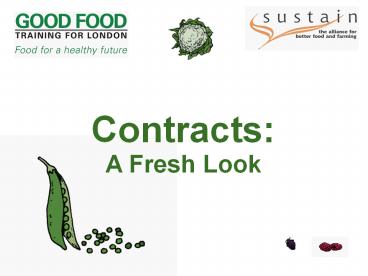Contracts: PowerPoint PPT Presentation
Title: Contracts:
1
Contracts A Fresh Look
2
Contracts A Fresh Look
- What is sustainable food?
- Jackie Schneider, Merton Parents and Childrens
Food Campaign 'You're the Customer raising
aspirations. - Roberta Sonnino, Cardiff University EU
Legislation and Creative Public Procurement. - Roy Heath, Cornwall Food Programme Contracts as
an ongoing dialogue. Managing relations with
suppliers. - Simon Doff, SALSA Due diligence and how
- accreditation can help.
- Panel discussion all speakers
3
Why change?
If everyone on earth lived as Londoners do, it
would require three planets to support them.
4
Why change?
Sustainable food has a positive impact
on People Good quality, healthy food
Educational opportunities Greater equality
across the supply chain The economy Thriving
local communities Sustainable livelihoods Secure
and resilient food supply The planet Animal
welfare Protecting natural resources Minimising
contribution to climate change
5
What is sustainable food?
- The 7 principles
- Eat the seasons!
- Support environmentally friendly farming
- Serve less meat and buy the best
- Seek out sustainable fish
- Choose Fairtrade
- Dont bottle it
- Serve up well-being
- www.sustainweb.org/sustainablefood
6
What is sustainable food?
- No legal definition, though some elements are
legally defined - Living within limits of our resources
- Sustains definition
- Food from farming and supply systems that
enhance the health and welfare of people and
animals, improve the working and living
environment, promote equity and enrich society
and culture.
7
Eat the seasons!
- Problems with out-of-season produce
- Environmental impact of production (e.g. heated
greenhouses, polytunnels) and storage - Loss of freshness, flavour, variety, and
resilience - Long-distance transport (fuel, waste, cool
chain refrigeration) - Benefits of seasonal, local food
- Potentially fresher and more nutritious
- Control over quality and traceability
- Consumer demand
- Reconnection with local food culture
- Support of local food production and economies
8
Farming for the planet
- Reduce your impact on the environment by
supporting environmentally friendly farming
- Get to know your farmer!
- or buy food grown to recognised accreditation
schemes, e.g. - Organic restricted use of agrochemicals and
high standards of animal welfare - LEAF (Linking Environment and Farming)
integrated management system aimed at reducing
environmental impacts - Assured Food Standards (Red Tractor logo)
requires farmers to comply with UK laws on the
environment, food safety, and animal welfare.
9
Meat and dairy products less but better
quality
- High consumption of meat and dairy products
- impacts on
- climate change 18 of greenhouse gases
- animal welfare
- Human health and wellbeing
- Work towards reducing quantity of meat
- used overall by
- offering more vegetarian options
- using meat wisely (and consider cheaper cuts)
- Buy the best local or British products produced
to high environmental and animal welfare
standards - Organic
- Free Range
- RSPCA Freedom Foods
- Assured Food Standards (AFS)
10
Trade fair
- The system isnt working
- Volatile world market prices for commodity
- crops such as coffee
- Unfair rules governing international trade
- Look for the Fairtrade Mark when buying imported
products such as coffee, tea, chocolate, rice,
tropical fruits and juices - Guaranteed minimum prices and Fairtrade premium
- Guaranteed minimum wages and increased rights as
workers - Commitment to improving working conditions and
sustainable farming methods - No forced or child labour
- www.fairtrade.org.uk
11
Dont bottle it!
- The tap vs. the bottle
- UK tap water is tested to stringent standards
- No known health benefits from drinking bottled
water - Cost effective
- 1000 spent on bottled water could cost 49p for
the same volume if taken from the tap - Fewer environmental costs- packaging, plastic
waste, transport and bottling. - Turn to the tap
- Serve in attractive jugs or re-useable bottles
- Install filtration systems
12
Plenty more fish in the sea...?
- Things to consider
- Health
- FSA 2 portions a week advice being reviewed
- Environmental problems
- Overfishing
- Destructive and wasteful fishing practices
- Farmed vs. wild
- Many farmed fish eat fish
- Problems with pollution, escapees
13
The North Atlantic
The best environmental choice in seafood
14
(No Transcript)
15
Serve up well-being
- Eat food. Not too much. Mostly plants.
- Increase use of wholegrains, base dishes around
carbohydrates (not proteins) - Highlight vegetable dishes and fresh fruit
options - Use fats and oils sparingly, avoid trans-fats and
reduce saturated fats - Serve appropriately-sized portions
- Highlight healthier options on menus

